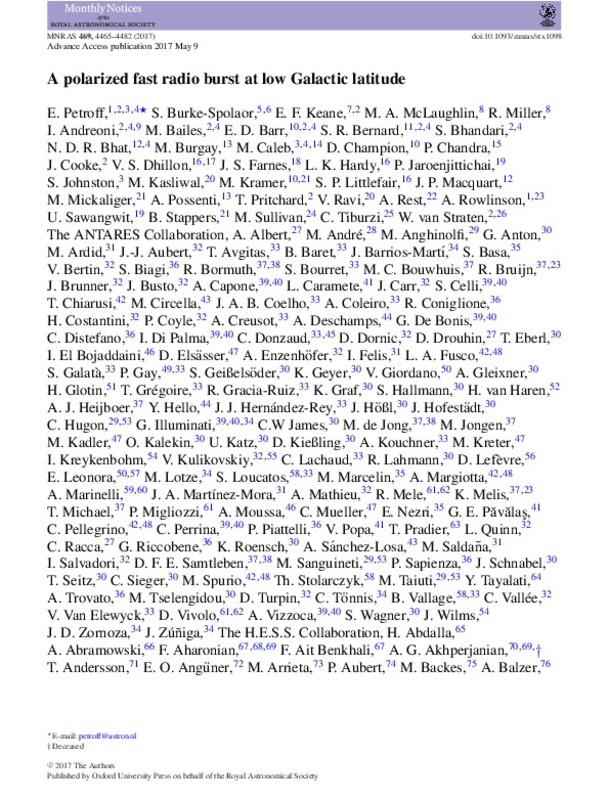|
Resumen:
|
[EN] We report on the discovery of a new fast radio burst (FRB), FRB 150215, with the Parkes radio telescope on 2015 February 15. The burst was detected in real time with a dispersion measure (DM) of 1105.6 ± 0.8 pc cm-3;3, ...[+]
[EN] We report on the discovery of a new fast radio burst (FRB), FRB 150215, with the Parkes radio telescope on 2015 February 15. The burst was detected in real time with a dispersion measure (DM) of 1105.6 ± 0.8 pc cm-3;3, a pulse duration of 2.8+1.2-0.25 ms, and a measured peak flux density assuming that the burst was at beam centre of 0.7+0.2-0.1 Jy. The FRB originated at a Galactic longitude and latitude of 24.66º,5.28º and 25º away from the Galactic Center. The burst was found to be 43 ± 5 per cent linearly polarized with a rotation measure (RM) in the range -9 < RM < 12 rad m-2 (95 per center confidence level), consistent with zero. The burst was followed up with 11 telescopes to search for radio, optical, X-ray, gamma-ray and neutrino emission. Neither transient nor variable emission was found to be associated with the burst and no repeat pulses have been observed in 17.25 h of observing. The sightline to the burst is close to the Galactic plane and the observed physical properties of FRB 150215 demonstrate the existence of sight lines of anomalously low RM for a given electron column density. The Galactic RM foreground may approach a null value due to magnetic field reversals along the line of sight, a decreased total electron column density from the Milky Way, or some combination of these effects. A lower Galactic DM contribution might explain why this burst was detectable whereas previous searches at low latitude have had lower detection rates than those out of the plane.
[-]
|
|
Agradecimientos:
|
The Parkes radio telescope and the Australia Telescope Compact Array are part of the Australia Telescope National Facility, which is funded by the Commonwealth of Australia for operation as a National Facility managed by ...[+]
The Parkes radio telescope and the Australia Telescope Compact Array are part of the Australia Telescope National Facility, which is funded by the Commonwealth of Australia for operation as a National Facility managed by CSIRO. Parts of this research were conducted by the Australian Research Council Centre of Excellence for All-sky Astrophysics (CAASTRO), through project number CE110001020 and the ARC Laureate Fellowship project FL150100148. This work was performed on the gSTAR national facility at Swinburne University of Technology. gSTAR is funded by Swinburne and the Australian Government’s Education Investment Fund. Funding from the European Research Council under the European Union’s Seventh Framework Programme (FP/2007- 2013) / ERC Grant Agreement n. 617199 (EP). MAM and RM are supported by NSF award #1211701. Research support to IA is
provided by the Australian Astronomical Observatory.
The support of the Namibian authorities and of the University of Namibia in facilitating the construction and operation of H.E.S.S. is gratefully acknowledged, as is the support by the German Ministry for Education and Research (BMBF), the Max Planck Society, the German Research Foundation (DFG), the French Ministry for Research, the CNRS-IN2P3 and the Astroparticle Interdisciplinary Programme of the CNRS, the U.K. Science and Technology Facilities Council (STFC), the IPNP of the Charles University, the Czech Science Foundation, the Polish Ministry of Science and Higher Education, the South African Department of Science and Technology and National Research Foundation, the University of Namibia, the Innsbruck University, the Austrian Science Fund (FWF), and the Austrian Federal Ministry for Science, Research and Economy, and by the University of Adelaide and the Australian Research Council. We appreciate the excellent work of the technical support staff in Berlin, Durham, Hamburg, Heidelberg, Palaiseau, Paris, Saclay, and Namibia in the construction and operation of the equipment. This work benefited from services provided by the H.E.S.S. Virtual Organization, supported by the national resource providers of the
EGI Federation.
The ANTARES authors acknowledge the financial support of the funding agencies: Centre National de la Recherche Scientifique (CNRS), Commissariat a l’ ` energie atomique et aux ´ energies ´ alternatives (CEA), Commission Europeenne (FEDER fund and ´ Marie Curie Program), Institut Universitaire de France (IUF), IdEx program and UnivEarthS Labex program at Sorbonne Paris
Cite (ANR-10-LABX-0023 and ANR-11-IDEX-0005-02), Labex ´ OCEVU (ANR-11-LABX-0060) and the A*MIDEX project (ANR11-IDEX-0001-02), Region ´ ˆIle-de-France (DIM-ACAV), Region ´
Alsace (contrat CPER), Region Provence-Alpes-C ´ ote d’Azur, ˆ Departement du Var and Ville de La Seyne-sur-Mer, France; Bun- ´ desministerium fur Bildung und Forschung (BMBF), Germany; Is- ¨
tituto Nazionale di Fisica Nucleare (INFN), Italy; Stichting voor Fundamenteel Onderzoek der Materie (FOM), Nederlandse organisatie voor Wetenschappelijk Onderzoek (NWO), the Netherlands;
Council of the President of the Russian Federation for young scientists and leading scientific schools supporting grants, Russia; National Authority for Scientific Research (ANCS), Romania; Ministerio de Econom´ıa y Competitividad (MINECO): Plan Estatal de Investigacion (refs. FPA2015-65150-C3-1-P, -2-P and -3- ´
P, (MINECO/FEDER)), Severo Ochoa Centre of Excellence and MultiDark Consolider (MINECO), and Prometeo and Grisol´ıa programs (Generalitat Valenciana), Spain; Ministry of Higher Education, Scientific Research and Professional Training, Morocco. We also acknowledge the technical support of Ifremer, AIM and Foselev Marine for the sea operation and the CC-IN2P3 for the computing facilities.
This work made use of data supplied by the UK Swift Science Data Centre at the University of Leicester. This research has made use of data, software and/or web tools obtained from the High Energy Astrophysics Science Archive Research Center (HEASARC), a service of the Astrophysics Science Division at NASA/GSFC and of the Smithsonian Astrophysical Observatory’s High Energy Astrophysics Division.
EP would like to thank R. Soria forChandra data reduction advice and thank J. Hessels, R. Soria, J. van Leeuwen, and L. Connor for useful discussion. R.C.G. Chaves was funded by EU FP7 Marie Curie, grant agreement No. PIEF-GA-2012-332350.
[-]
|









